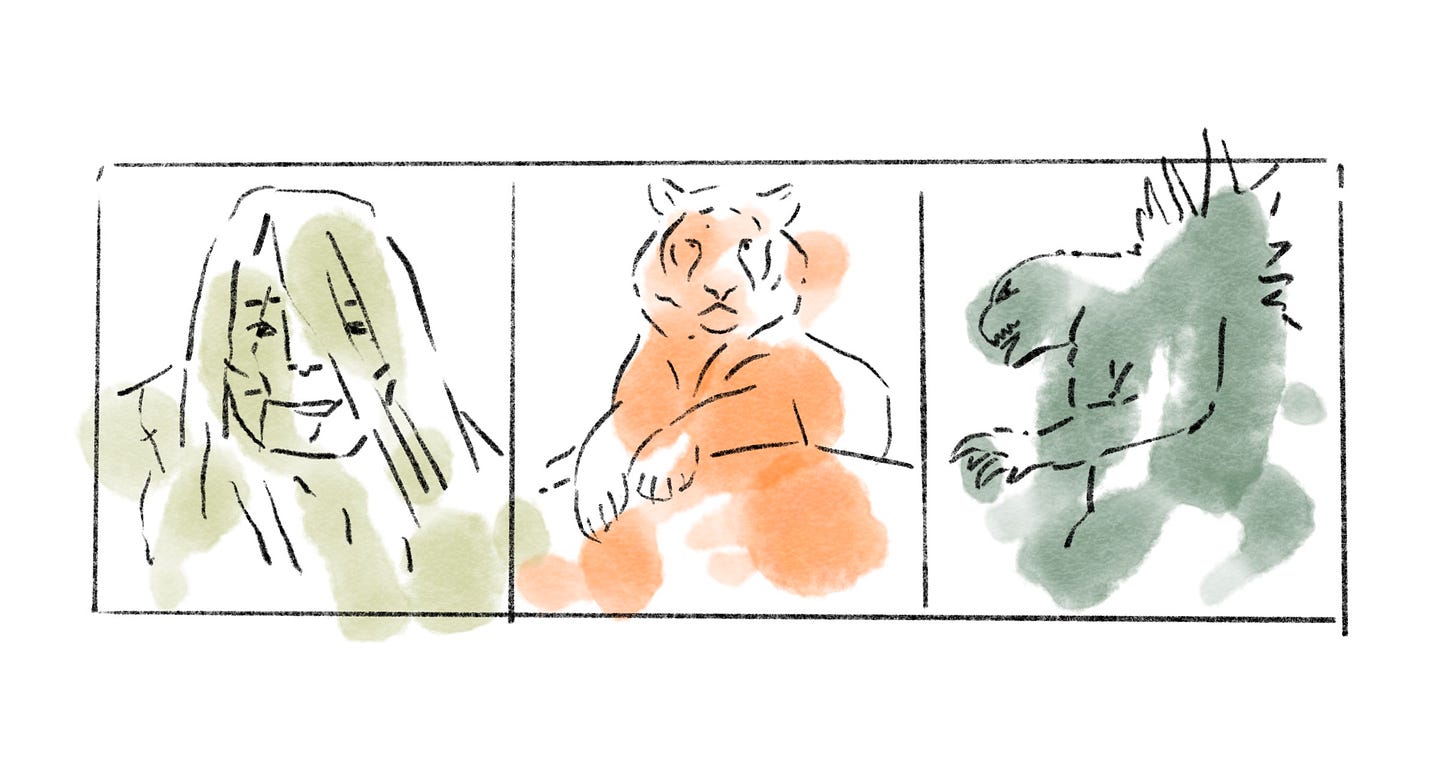Triptych: Man-Made Monsters
Triptych is a newsletter where I share 3 works on 1 theme.
“He who fights with monsters might take care lest he thereby become a monster. And if you gaze for long into an abyss, the abyss gazes also into you.”
—Friedrich W. Nietzsche
Forgive the lateness of this post, but if big business is already selling Christmas decorations, then little ol’ me can extend my Halloween celebration a little further into November.
I’ve always loved a good monster. I remember begging my parents to let me watch Jurassic Park for the first time. They finally acquiesced, with the promise that my older siblings would cover my eyes for the worst parts. I watched those parts through their fingers and kept my feet off the ground in case a velociraptor was chilling under it—you can’t be too careful.
I had nightmares for weeks, and I immediately wanted to watch it again.
What can I say?
Sometimes, we are our own worst enemy. Sometimes we make our own monsters. The power of the monster in any story is measured in how much courage, resilience, grit, sweat, blood, and tears must be summoned to face, vanquish, or transform it. A hero is only as good as its monster.
Here are three works that explore monsters of our own making in one way or another.
#1
📖
Frankenstein (1818)
by Mary Shelly
“I will revenge my injuries: If I cannot inspire love. I will cause fear…”
Here’s a woman-made monster. Women can make monsters, too! I only just got around to reading Frankenstein in October. It’s a haunting masterpiece whose themes are as relevant today as they ever were. How did this novel come to be? Basically, Lord Byron challenged a bunch of writer types to a ghost story contest, and our girl, Mary, made fools of everyone. That’s what happened. Don’t believe it? Look it up.
In this novel, Shelley explores ideas such as the danger of ambition, what the creator owes creation and vice versa, the effects of isolation, and much more. I couldn’t get this African proverb out of my head after reading it: “The child who is not embraced by the village will burn it down to feel its warmth.” The depth and complexity of this work are all the more astounding when you realize she was 18 when she wrote it. EIGHTEEN.
#2
📖
The Tiger: A True Story of Vengeance and Survival (2010)
by John Valiant
“The impact of an attacking tiger can be compared to that of a piano falling on you from a second story window. But unlike the piano, the tiger is designed to do this, and the impact is only the beginning.”
When you push nature, it pushes back. A Tiger in Siberia goes man-eater after being shot at one too many times. While this book is non-fiction, it reads like a thriller. Valiant retraces the steps of the tiger as well as the anti-poaching inspector, Yuri Trush, called in to end the tiger’s rampage. If you think the tiger is resilient, wait till you meet the people who inhabit one of the harshest environments on the planet. Those people are tough as hell.
This book offers vital lessons for coexisting peacefully with apex predators—essential for maintaining the balance and health of our ecosystems. Care about nature? This one’s for you. Are tigers your favorite animal? This one’s for you.
#3
🎥
Godzilla Minus One (2023)
“This next battle is not one waged to the death, but a battle to live for the future.”
The heavyweight champion of monsters is back, and this time it’s personal.
Japanese filmmaker Takashi Yamazaki brings Godzilla back to its roots as a metaphor for the destructive power of the atomic bomb. This film received an Oscar for Best Visual Effects, but it isn’t spectacle for spectacle’s sake—unlike almost every American take on Godzilla. (Shots fired. Sorry, not sorry.)
The score and film take cues from Godzilla (1954) but explode it into something infinitely more epic and heartfelt. The pacing is reminiscent of old World War II movies. The film takes its time introducing the key characters, and simply put, you actually care about them. The characters' stories are centered, not used for weak stitching between mind-melting, never-ending action sequences with zero emotional payoff or consequence to the plot. Each action sequence is measured and more compelling as a result.
At its heart, this film is about a Japanese kamikaze pilot who fails in his mandate and is haunted by his failure to act. It explores the meaning of courage, sacrifice, and honor—the most human Godzilla movie yet.
If you’ve read or watched any of the above or have other recommendations, spill it. I'd love to hear your take in the comments.



